Bir kedideki nekrotizan fasiit olgusundan izole edilen iki zoonotik bakteri: Streptococcus canis ve Staphylococcus felis
Abstract
Nekrotizan fasiit (NF) deri altı ve fasiyal dokuların hızla yayılan, potansiyel olarak hayati tehlike yaratan bakteriyel bir enfeksiyonu olup, hastalığın etiyolojisinde farklı bakteriler yer alır. Bu bildiride bir özel veteriner kliniğine yüzde yara şikâyetiyle getirilen 2 yaşında, 3 kg ağırlığındaki dişi tekir kedinin klinik muayenesinde NF olası tanısı konulan bir olgu sunu amaçlanmıştır. Hasta kedinin klinik muayenesinde genel durumun iyi olduğu, yüz bölgesinin her iki tarafında irinleşmemiş nekrotik lezyonlar olduğu saptandığı için Harran Üniversitesi Veteriner Fakültesi Mikrobiyoloji Anabilim Dalına başvuruldu. Lezyonlu bölgelerden alınan steril svap örneklerinden %7 koyun kanlı agara ekim yapılarak aerobik ve anaearobik olarak inkübe edildi. Oluşan koloniler identifikasyona alındı. Klasik biyokimyasal testlerle Staphylococcus spp. ve Streptococcus spp. olarak saptanan etkenler MALDI-TOF’la (Bruker Corporation; Billerica, MA, USA) aynı zamanda zoonoz ajanlar olan Staphylococcus felis ve Streptococcus canis identifiye edildi. Kirby-Bauer disk difüzyon tekniğiyle yapılan antibiyotik duyarlılık testine göre Staphylococcus felis tetrasiklin, penisilin, enrofloksasin, ampisilin, gentamisin, eritromisin, vankomisin, novobiosin, amoksisilin/klavulonik asit ve imipenem’e duyarlı, neomisin ve streptomisin’e orta derecede duyarlı ve oksasilin’e dirençli bulunurken, Streptococcus canis penisilin, oksasilin, enrofloksasin, ampisilin, eritromisin, vankomisin, amoksisilin/klavulonik asit ve imipenem’e duyarlı, neomisin, tetrasiklin, novobiosin’e orta derecede duyarlı, streptomisin ve gentamisin’e dirençli olarak saptandı. Bu sonuçlara göre tedavi olarak 10 gün süre ile enrofloksasin + amoksisilin/kalvulonik asit kombinasyonu yapıldı. Tedavi, 2 hafta kantaron yağı, sonrasında aloea-vera sıvısı ve jeli, ayrıca propolisle desteklendi. Tedavi süresi sonucunda klinik iyileşme gözlendi. Sonuç olarak farklı bakteriler tarafından oluşturulabilen NF olgularında başarılı bir tedavi için, etiyolojinin ve duyarlı antibiyotiklerin belirlenmesinin hayvan ve insan sağlığı açısından önemli olduğu sonucuna varıldı.
References
- Anne M (2008): Necrotizing fasciitis: a diagnostic and management challenge. Erişim adresi: http://www.o-wm.com/article/491 Erişim tarihi: 05.02.2009
- Bellapianta JM, Ljungquıst K, Tobın E, Uhl R (2009): Necrotizing fasciitis. JAAOS, 17, 174-182.
- Berube DE, Whelan MF, Tater KC, Bracker KE (2010): Fournier’s gangrene in a cat. JVECC, 20, 148–154.
- Brachelente C, Wiener D, Malik Y, Huessy D (2007): A case of necrotizing fasciitis and septic shock in a cat caused by Acinetobacter Baumannii. Veterinary Dermatology 18, 432-438.
Two zoonotic bacteria isolated from a cat with necrotizing fasciitis: Streptococcus canis and Staphylococcus felis
Abstract
Necrotizing fasciitis (NF) is a potential life-threatening bacterial infection spreading into subcutaneous and fascial tissues rapidly. Several different bacteria involve in the etiology of the disease. In this report, a case has been presented with a probable diagnosis of necrotizing fasciitis from a two-year-old female tabby cat weighing 3 kilograms which is admitted to a veterinary clinic with the complaint of fascial wound. The cat was brought to Harran University Faculty of Veterinary Medicine Microbiology department because she has necrotic lesions without pus in her two sides of face. General condition of cat was evaluated as normal. Swabs taken from lesions were cultured on blood agar. After incubaton period, isolated bacteria were identified as Staphylococcus spp. and Streptococcus spp. by classical biochemical tests and as Staphylococcus felis ve Streptococcus canis, which are also zoonotic agents, by MALDI-TOF (Bruker Corporation; Billerica, MA, USA). According to Kirby-Bauer disk diffusion antibiotic sensitivity test results, Staphylococcus felis was found to be sensitive to tetracycline, penicillin, enrofloxacin, ampicillin, gentamicin, erythromycin, vancomycin, novobiocin, amoxicillin/clavulanic acid and imipenem, mildly resistant to neomycin and streptomycin, and resistant to oxacillin. Streptococcus canis was found to be sensitive to penicillin, oxacillin, enrofloxacin, ampicillin, erythromycin, vancomycin, amoxicillin/clavulanic acid, and imipenem, mildly resistant to neomycin, tetracycline, and novobiocin, and resistant to streptomycin and gentamicin. According to these results, a treatment regimen involving enrofloxacin and amoxicillin / clavulanic acid combination was given for 10 days. Treatment was also supported by the oil of centaury, aloe vera gel, and propolis for two weeks. At the end of treatment, clinical improvement was observed. As conclusion, it was thought that an effective treatment should include the determination of the etiological agents of NC and to use effective antibiotics to these agents for both animal and human health.
References
- Anne M (2008): Necrotizing fasciitis: a diagnostic and management challenge. Erişim adresi: http://www.o-wm.com/article/491 Erişim tarihi: 05.02.2009
- Bellapianta JM, Ljungquıst K, Tobın E, Uhl R (2009): Necrotizing fasciitis. JAAOS, 17, 174-182.
- Berube DE, Whelan MF, Tater KC, Bracker KE (2010): Fournier’s gangrene in a cat. JVECC, 20, 148–154.
- Brachelente C, Wiener D, Malik Y, Huessy D (2007): A case of necrotizing fasciitis and septic shock in a cat caused by Acinetobacter Baumannii. Veterinary Dermatology 18, 432-438.
Details
| Primary Language | Turkish |
|---|---|
| Subjects | Veterinary Surgery |
| Journal Section | CASE REPORT |
| Authors | |
| Publication Date | June 15, 2021 |
| Submission Date | January 12, 2021 |
| Acceptance Date | March 19, 2021 |
| Published in Issue | Year 2021 Volume: 92 Issue: 2 |
Veteriner Hekimler Derneği Dergisi (Journal of Turkish Veterinary Medical Society) is an open access publication, and the journal’s publication model is based on Budapest Access Initiative (BOAI) declaration. All published content is licensed under a Creative Commons CC BY-NC 4.0 license, available online and free of charge. Authors retain the copyright of their published work in Veteriner Hekimler Derneği Dergisi (Journal of Turkish Veterinary Medical Society).
Veteriner Hekimler Derneği / Turkish Veterinary Medical Society


